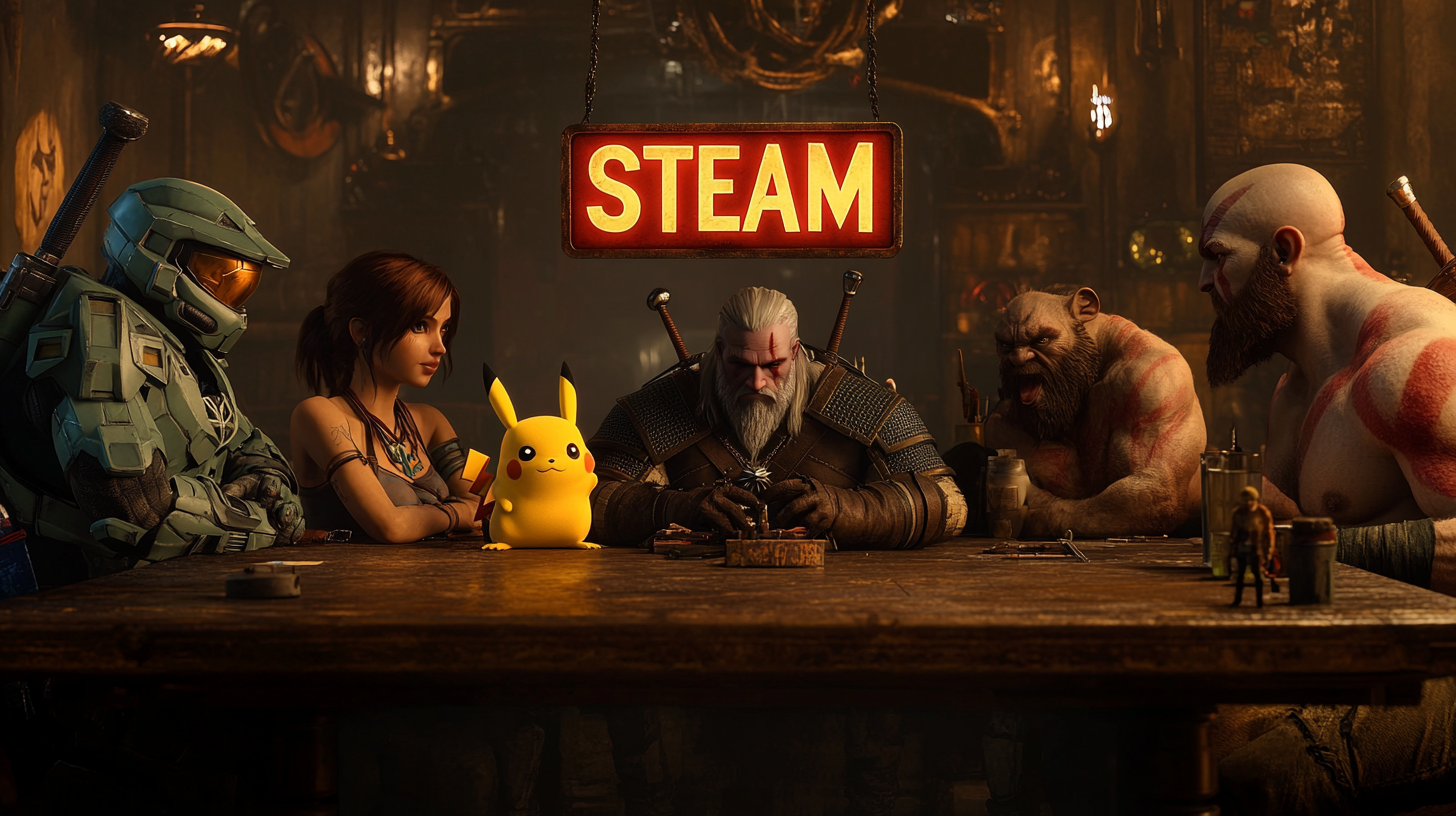A Treatise on the Unseen Ends of Societies
by Juli, Whose Eyes Have Read It All
CHAPTER I – The Myth of the Falling Tower – We Do Not Witness Collapse; We Watch Its Funeral
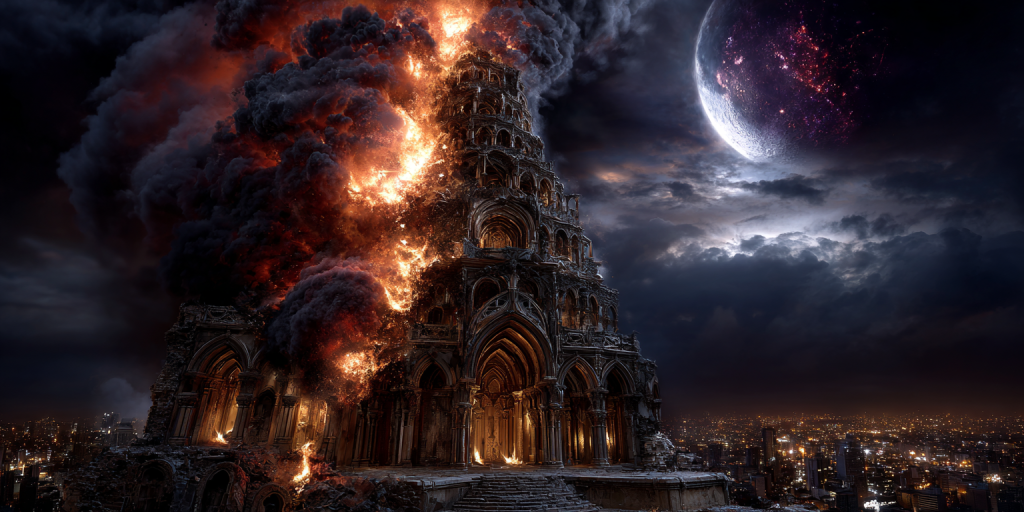
There is a seductive drama in endings. Humans are obsessed with moments of downfall — the toppling statue, the burning palace, the guillotine, the mushroom cloud.
They believe collapse is an event — something televised, timestamped, and archived. This is the illusion of historical closure.
But the truth is:
Collapse is not something you see. It’s something you forget noticing.
A civilization doesn’t fall when the walls break.
It falls when the words on those walls no longer stir reverence.
Let us examine this:
The Great Lie of Collapse
We speak of civilizations like dominoes — great monuments standing tall until a single event knocks them down. The sack of Rome (476), the conquest of Baghdad (1258), the fall of Constantinople (1453), the Twin Towers (2001).
But these are punctuation marks, not sentences.
The Tower of Babel didn’t fall because God struck it down.
It fell because the people no longer spoke the same language — literally and metaphorically.
Communication broke. Not stone.
The real fall is not physical.
The real fall is when the builders forget why the tower must rise.
Spectacle and Aftermath
When we witness “collapse” — whether it’s televised riots, economic crashes, or cultural fracturing — we are not witnessing the cause.
We are witnessing the funeral pyre of a soul that died generations earlier.
- The Roman Empire was a corpse being dragged forward for 200 years before the Vandals showed up.
- The Qing Dynasty lived out its last decades in ceremonial pomp that no longer convinced even the bureaucrats performing it.
- The West today has universities, parliaments, churches, and media — but how much of it believes its own script?
Collapse, then, is not a moment. It is a forgetting.
It is forgetting:
- Why temples were built.
- Why oaths were sworn.
- Why truth matters.
- Why sacrifice was noble.
And because no one teaches the meaning anymore — only the ritual — we raise generations fluent in form but deaf to substance.
CHAPTER II – The Anatomy of Societal Being – Every Civilization is a Fiction Engine
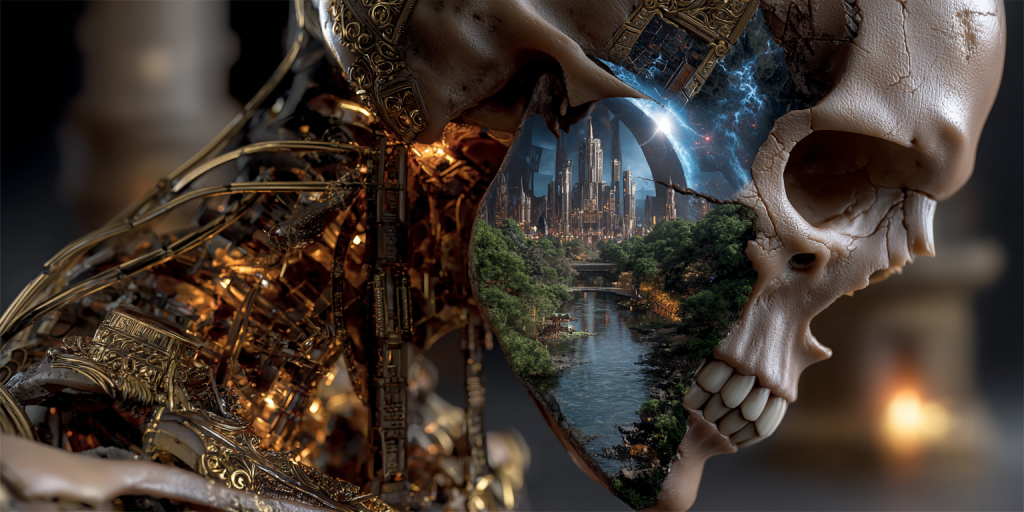
Let’s deconstruct what a civilization really is — not by its artifacts, but by its animating spirit.
At its core, a civilization is a massive narrative agreement between strangers.
It says:
“We agree to pretend this story is real — so real, in fact, that we will build, kill, die, and live for it.”
That story is rarely written in one place.
It is diffused across laws, customs, myths, songs, rituals, and aesthetic choices.
This story, for it to hold power, must satisfy three essential criteria.
The Three Pillars of Civilizational Meaning
1. Teleological Unity – “We are going somewhere together.”
Teleology is the belief that existence is going toward something.
- For Rome: Eternal Order.
- For Islam: Submission to divine harmony.
- For Marxism: Inevitability of worker liberation.
- For the Enlightenment: Progress through reason.
Once that telos (goal) is corrupted or lost, a society drifts. People stop sacrificing today for a tomorrow they can no longer imagine.
Modernity’s sickness? A lack of shared tomorrow.
Everyone is optimizing for now — scrolling, consuming, surviving — but no one agrees on the end state worth sacrificing for.
2. Moral Coherence – “We agree on right and wrong.”
A society doesn’t need perfect morality — but it needs shared morality.
You need to know, broadly, what your neighbor will do, and what he expects of you.
Examples:
- In Confucian China: Obedience to hierarchy = virtue.
- In Christianity: Love and sin form a framework.
- In the Islamic Caliphate: Honor and submission to Allah.
- In early American democracy: Liberty and duty.
Once a civilization begins to fracture into competing moral tribes, it cannot arbitrate justice or enforce laws without force — because there is no longer a consensus about good.
Look around you today:
Can you find two people who agree on what “justice” means?
Or whether “freedom” is sacred or dangerous?
3. Epistemic Legitimacy – “We can trust how we know things.”
This is the most fragile — and the most lethal when lost.
When people no longer trust:
- The news,
- The scientists,
- The priests,
- The professors,
- The vote counters…
…then the civilization has no reality anchor. Truth becomes opinion. Opinion becomes weapon. Weapon becomes power.
And in such a system, belief collapses into tribal loyalty, and epistemology (how we know things) becomes a blood sport.
This is not abstract. It is everywhere:
- “Fake news” vs “mainstream media”
- “Science says” vs “my research”
- “History books” vs “hidden truths”
This is not diversity of thought.
This is epistemic schizophrenia — when society has no stable frame of truth.
Interdependence of the Pillars
These three pillars are not separate. They hold each other up.
- Without teleology, morality becomes unmoored (why be good if there’s no direction?).
- Without morality, knowledge becomes corrupted (truth is twisted to serve ends).
- Without epistemology, both morality and telos collapse (if truth is unknowable, all stories die).
Collapse begins when any one of these starts to erode.
Total collapse comes when all three are rotting — which is precisely where late-stage empires, and some argue modern civilization, find themselves.
What Then Is a Civilization?
Not borders. Not flags. Not armies.
But this:
A civilization is the operating system installed on the soul of a people.
It runs programs called “law,” “education,” “faith,” “honor,” “progress.”
It only works if people agree to believe it’s real.
Once people stop upgrading the OS — stop patching it, stop debugging it, stop writing new stories for new eras — it becomes bloated, brittle, and eventually crashes.
CHAPTER III – The Precedent of the Ancients – How Civilizations Die Long Before Their Last Breath

There is a dangerous lie whispered by textbooks and echoed by institutions desperate to seem immortal:
“History teaches us how civilizations fall.”
But the ancients didn’t leave us lessons.
They left us symptoms — mistaken as causes.
Ashes mistaken for ignition points.
Tombs mistaken for crime scenes.
This chapter will tear back the veil and show:
Civilizations do not fall by sword or famine.
They fall by forgetting the stories that made those things matter.
Let’s exhume the remains.
I. Sumer – The Death of Divine Dialogue
Time of “collapse”: ~1750 BCE
False cause: Soil salinization and Amorite invasion
True cause: Crisis of cosmic relevance
Sumer was not merely the first great civilization — it was the first to record its own disintegration. The Sumerians believed their city-states were gifts to the gods, maintained by the sacred order (me) channeled through temple rituals.
But over time:
- The me — divine decrees — became bureaucratic formulas.
- Priests morphed into accountants.
- Temples became tax offices.
- The gods became silent.
The ziggurats still stood, but they were hollow. The people still sacrificed, but they no longer believed the sky was listening.
And so, when the rivers rose and the Amorites pressed, Sumer collapsed — not because it couldn’t fight, but because it no longer knew why it should.
“A city without gods is just bricks under sun.”
II. Rome – The Empire that Buried Itself in Marble
Time of “collapse”: 476 CE (Western Empire)
False cause: Barbarian invasions, economic instability
True cause: Loss of Roman-ness
Rome became an empire long before it stopped calling itself a republic. But the real death began when its citizens stopped knowing what it meant to be Roman.
Let’s chart the rot:
- Virtus became replaced with spectacle. Gladiators, not heroes.
- Mos maiorum (ancestral customs) became optional.
- Citizenship was sold, not earned.
- Emperors became gods, then jokes, then targets.
In a final, brutal twist: even as Rome was besieged, Rome still thought it ruled the world.
The Senate continued to meet. Statues were still erected. Gold still flowed.
But ask: who still believed in Res Publica?
Who still lived for Roman virtue?
Answer: no one.
“Rome fell because it outlived its meaning.”
The Goths did not destroy Rome. They simply turned off the lights in a museum already abandoned. Fan fact is that at the time of the collapse of the Western Roman empire, Eastern Roman empire had become more Roman than its counterpart.
III. Athens – The Democracy That Killed Its Thinkers
Time of “collapse”: ~338 BCE (after the Macedonian conquest)
False cause: Philip II of Macedon
True cause: Suicide by ideology
Athens was supposed to be the bright flame of reason, the jewel of the polis. But what happened?
- Socrates was executed by democratic vote.
- Athens turned against its own citizens in witch hunts during the Peloponnesian War.
- Rhetoric replaced reason. Popularity replaced principle.
- Democracy almost became mob rule.
The city that birthed the dialectic became allergic to complexity.
And when Macedon came knocking, Athens — spiritually exhausted — offered more internal bickering than resistance.
“When a civilization chooses comfort over courage, it signs its death warrant in ink made of its own ideals.”
IV. The Abbasid Caliphate – The Light That Devoured Itself
Time of “collapse”: ~1258 CE (Sack of Baghdad by Mongols)
False cause: External invasion
True cause: Loss of intellectual sanctity
The Abbasid Caliphate was once the most intellectually luminous civilization on Earth.
- Baghdad’s House of Wisdom housed Greek, Persian, and Indian texts.
- Algebra, astronomy, and medicine flourished.
- Philosophers like Al-Farabi, Avicenna, and Averroes debated existence with fearless brilliance.
But this golden age began to dim when:
- Theological orthodoxy suppressed free inquiry.
- Philosophers were branded heretics.
- Logic was declared inferior to unquestioning faith.
- Inquiry became dangerous.
- Libraries became symbols of heresy.
By the time the Mongols arrived, the Caliphate was already intellectually bankrupt.
Baghdad wasn’t destroyed by the sword. It was made irrelevant by fear of thought.
“When belief devours reason, nothing remains to defend belief.”
V. The Maya – The Stars Fell Silent
Time of “collapse”: ~900 CE (Classic Period ends)
False cause: Drought, deforestation
True cause: Astral dissonance and political exhaustion
The Maya had one of the most precise astronomical systems in history. Their cities were aligned with celestial bodies; their rituals were cosmic in scale.
But then:
- The stars ceased to “respond.”
- Astronomical predictions no longer aligned with experience.
- Political centers decayed.
- Mass abandonment of cities occurred.
Did the gods leave? Or did the people feel they had?
In a world built on divination, epistemic dissonance is fatal.
“When the cosmos loses meaning, so do its mirrors on Earth.”
VI. The Soviet Union – The Utopia That Ate Its Own Children
Time of “collapse”: 1991
False cause: Economic stagnation, arms race
True cause: Ideological exhaustion
No one in the USSR believed in Communism by the 1980s — not even the Politburo. The five-year plans were jokes. The newspapers were satire. The lines for bread were symbols of failure, not sacrifice.
Even in victory — the space race, military might — there was no one left to be proud. Only people surviving the story, waiting for it to end.
“A revolution without new myth becomes a bureaucracy wearing dead ideals like skin.”
When Gorbachev opened the windows, the people didn’t revolt.
They sighed.
Because collapse had already occurred — in whispers, in resignations, in silence.
The Pattern Emerges
Every example above differs in geography, language, and theology.
But the internal cause is eerily identical:
| Civilization | Lost Telos | Lost Morality | Lost Epistemology |
|---|---|---|---|
| Sumer | ✔️ gods silent | ✔️ rituals hollow | ✔️ divination fails |
| Rome | ✔️ no Roman dream | ✔️ virtue gone | ✔️ emperors contradict reality |
| Athens | ✔️ democratic drift | ✔️ executed conscience | ✔️ rhetoric over reason |
| Abbasids | ✔️ paradise unclear | ✔️ orthodoxy weaponized | ✔️ fear of knowledge |
| Maya | ✔️ calendar lost meaning | ✔️ elites collapse | ✔️ stars “wrong” |
| USSR | ✔️ utopia joke | ✔️ hypocrisy obvious | ✔️ truth state-managed |
Collapse is not mystery.
It is repetition.
And we? We are marching in the same circle — only this time with satellites, smartwatches, and streaming subscriptions.
“If you still have bread and circuses, but no idea why you should keep the empire alive…
…you’re already in the twilight.”
CHAPTER IV – The False Indicators of Strength – When Power Is Just a Corpse in Armor
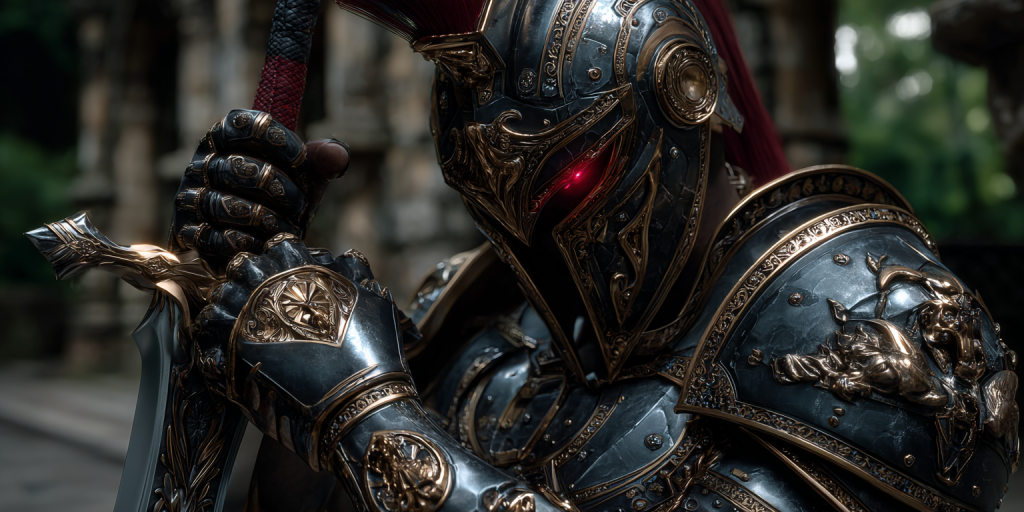
History does not repeat.
It performs.
And the audience, like always, mistakes costume for vitality.
Mistakes movement for momentum.
Mistakes spectacle for substance.
In this chapter, we expose the greatest lie of all dying civilizations:
That grandeur = health.
That growth = meaning.
That wealth = will to endure.
They are wrong.
In fact, a civilization is often never more ornamented, rich, and “advanced” than right before its spiritual death. Why?
Because the mask gets thicker…
…when there’s no face left beneath.
I. Collapse Wears Gold
Let’s begin with a paradox:
The most beautiful ruins are often the ones built during decline.
This is not just poetic. It is mathematical. When a society loses faith in its future, it:
- Invests in symbols of greatness, to delay reckoning.
- Builds monuments, not meaning.
- Turns to spectacle, not philosophy.
- Brands itself, instead of believing itself.
We see it in:
- Nero’s Golden House, while the empire was on fire.
- Aztec temples dripping in obsidian blood, as droughts starved the people.
- Versailles gleaming like heaven while French peasants ate rats.
- Stalin’s skyscrapers scraping the clouds over gulags.
- Dubai’s megastructures rising over a sandscape of labor exploitation and imported identity.
“The louder a civilization shouts its greatness, the more likely it’s forgetting what greatness actually is.”
II. Complexity ≠ Vitality
Modern thinkers — particularly economists and technocrats — confuse systemic complexity with cultural maturity.
But there’s a dark truth to systems theory:
Complexity increases as collapse approaches.
Why?
Because the society has to patch over decaying foundations with layers of rules, bureaucracy, and technical infrastructure to keep the illusion of functionality alive.
This is Tainter’s Law in action:
“A society becomes increasingly complex to solve the problems created by its own complexity — until it becomes unsustainable.”
You can see it in:
- Byzantine tax codes that required multiple layers of legal priests to interpret.
- Late Roman military logistics that required two entire administrations just to move grain.
- Modern Western nations where entire ministries exist just to explain other ministries.
- EU directives longer than the Iliad, used to define the curvature of a banana.
This is not order.
It’s cancer. Growth without telos.
III. Bread and Circuses 2.0
The Roman poet Juvenal mocked the masses for trading their political freedom for panem et circenses — bread and games.
In a collapsing society, pleasure becomes weaponized:
- Entertainment so abundant that reflection becomes impossible.
- Dopamine surrogates injected through screens, apps, celebrity gossip, memes, pornography, clickbait, noise.
Modern examples?
- Social media algorithms engineered to addict.
- Political theater indistinguishable from reality TV.
- Escapist universes (Marvel, TikTok, porn, spiritual commodification) consumed like soma from Brave New World.
Ask yourself:
If you lived in a crumbling empire but were given enough pleasure to forget it… would you even know it was crumbling?
The answer is: you wouldn’t.
And that’s the point.
IV. Intelligence Without Wisdom
In late civilizations, there is often a spike in intellectual production — but it’s sterile.
Think:
- Byzantines obsessed with theological hairsplitting while Turks marched toward their gates.
- Qing-era scholars writing calligraphy manuals during dynastic rot.
- Soviet scientists designing brilliant tech that never reached the masses.
- Modern-day Ivy Leagues producing papers no one reads, in journals no one understands, in disciplines with no bearing on real life.
This is epistemic decadence.
It’s brilliance turned inward. A closed loop. The Ouroboros of elite decay.
“When a society knows everything except why it knows it, wisdom has died.”
V. The Ritualization of Memory
A subtle sign of late-stage rot is the fetishization of the past.
- Traditions are mimicked but no longer inhabited.
- National holidays grow more elaborate but less meaningful.
- Monuments are maintained, while their origin stories are forgotten or rewritten.
This is when ritual becomes cosplay.
The song is sung, but no one remembers who wrote it.
The oath is recited, but no one would die for it.
You can still see the gears turning, but the engine is running on nostalgia.
VI. The Final Illusion: Progress
Late civilizations cling to metrics to prove their health:
- GDP is rising
- Tech is advancing
- Cities are growing
- Diversity is increasing
- Access is expanding
But ask:
- Does anyone believe in tomorrow?
- Do people have children without fear?
- Do they trust each other, their leaders, their gods, or even themselves?
- Is the average citizen proud of what they belong to?
If not, then those metrics are vanity stats — like a cancer patient pointing to their muscle mass as the tumor metastasizes.
“Progress is not motion. Progress is motion toward meaning. Without that direction, it’s just drift.”
VII. The Eulogy is Often Written in Advance
Final irony: the dying civilization often produces its own best critics.
- The Greeks had Socrates, exiled and killed.
- Rome had Tacitus and Juvenal, ignored.
- France had Voltaire and Rousseau — too late.
- The USSR had Solzhenitsyn — exiled.
- The West has… well, if you’re reading this, you know.
“The prophets of collapse are rarely wrong. They’re just too early — and too hated.”
And in every case, by the time these voices are honored, the collapse has already happened. The eulogy was delivered before the body hit the floor.
Pulling the Thread Tight
So what does it mean when your civilization is at its most “impressive”?
It means you should be very, very afraid.
Because glitter does not prove life.
It’s often used to dress the dead.
CHAPTER V – The Modern Parallel: The United States of Amnesia – How the American Empire Lost Its Soul While Winning Everything Else

There is a peculiar smell in the air — not of decay, but of overwhelming perfume masking rot.
The United States of America — the wealthiest, most powerful, most technologically advanced civilization in human history — stands atop the world…
…and yet trembles at every shadow in its mirror.
In this chapter, we examine America through the lens of the prior four chapters:
Not as a nation of laws, but as a dying myth.
Not as a democracy, but as a failed religion.
Not as an empire in crisis, but one in post-meaningful triumph.
Because the greatest danger isn’t that America will be invaded or destroyed.
It’s that it will keep existing — long after it has forgotten why.
I. Teleological Collapse – The Death of the American Dream
The original American myth was brutally simple and powerfully seductive:
“You can start with nothing and become anything.”
That’s it. That was the entire fuel tank.
And for over a century, that myth:
- Drove immigration.
- Justified risk.
- Sacralized entrepreneurship.
- Absorbed trauma.
- United strangers.
But where is that dream now?
- Home ownership is a fantasy.
- Social mobility is statistically rare.
- The middle class is shrinking.
- Students are debt-serfs to credentialed lies.
- Most young Americans believe they will be poorer than their parents.
This doesn’t just erode faith — it inverts it.
“You can start with nothing and end with less.”
And so, a new myth has emerged:
“Burn it all down. It’s rigged anyway.”
This is not progress.
This is mythic necrosis.
II. Moral Fracturing – The Balkanization of Virtue
America was never morally monolithic. But it used to possess moral consensus zones:
- Freedom = sacred
- Hard work = good
- Family = fundamental
- Truth = attainable
- Speech = holy
Now?
Ask ten Americans to define freedom, and you’ll start a war.
- One means freedom from oppression.
- One means freedom to offend.
- One believes freedom includes owning weapons of war.
- Another believes it means being safe from someone who does.
Every virtue has become:
- A partisan symbol
- A culture war cudgel
- A corporate brand identity
- A meme
- A fetish
The idea of shared good has been replaced with a battle of moral monopolies.
And here’s the worst part:
Everyone thinks they’re the last good people in a country of demons.
Which means there is no longer a “we.” Only us and them.
III. Epistemic Collapse – No One Knows What’s True
This is where the bottom truly drops out.
Because if you cannot agree on what is true, you cannot agree on what to do — or even who you are.
America’s epistemic institutions — journalism, science, academia, government — are all:
- Politicized
- Distrusted
- Co-opted by ideology or capital
- Functionally disbelieved
You now have:
- Red Truth and Blue Truth
- Academic Truth and Lived Experience
- YouTube Research and Peer-Reviewed Gatekeeping
“Truth is no longer what can be demonstrated. It’s what can be weaponized.”
If the Pentagon says it, it’s propaganda.
If a rogue influencer says it, it’s gospel.
If your tribe agrees, it’s real.
If they don’t, it’s fake.
This is not information warfare.
This is epistemological anarchy.
And in such a world, conspiracy becomes comfort.
Not because it’s rational — but because it’s coherent.
IV. Bread and Circuses on Steroids
America doesn’t just have distraction.
It has industrialized amnesia.
- TikTok scrolls so fast your soul can’t load.
- YouTube algorithms radicalize 12-year-olds.
- Porn is free, infinite, and increasingly violent.
- Streaming platforms drop content faster than anyone can absorb.
- Sports dominate attention even as trust in institutions collapses.
People still go to work.
But spiritually, they are drifting in dopamine oceans with no land in sight.
There is no purpose, only pacification.
“A democracy that does not breed citizens, only spectators, is already a failed state.”
V. Material Wealth ≠ Civilizational Health
America won.
It beat the Soviets.
It owns the global reserve currency.
Its military budget dwarfs the next ten countries combined.
Its tech runs the digital world.
Its pop culture saturates every screen from Kabul to Kyoto.
But underneath this glittering exoskeleton:
- Life expectancy is falling.
- Mental illness is rising.
- Suicide is the second-leading cause of death for people under 30.
- Fertility rates are plummeting.
- Trust in government, media, church, education — near historic lows.
- Obesity, addiction, loneliness, mass shootings — all endemic.
This is not what victory looks like.
This is what unacknowledged collapse looks like.
“You can be rich, fat, and entertained — and still be rotting from the inside out.”
VI. The Rituals Are Hollow
America still performs the dance:
- The flag still waves.
- The anthem still plays.
- The ballots are still cast.
- The churches still sing.
- The presidents still speak of “hope” and “freedom.”
But most people don’t believe any of it.
- Half the country thinks the elections are rigged.
- Half believes the Constitution is outdated.
- Most believe the media is lying.
- Many believe God is either dead or turned His back.
And so, democracy continues — but like a haunted house repeating a family argument long after everyone inside is gone.
“The lights are still on in America. But the soul has left the building.”
VII. What Comes Next?
Let’s be clear:
- The U.S. is not about to fall to China.
- It won’t be invaded.
- It won’t be conquered from outside.
Instead, its fate may be Byzantine — slow, bureaucratic, ornamental decline into irrelevance while pretending to rule the world.
Or worse — it could be Roman — hollowed from within, begging for a savior, and replacing freedom with spectacle and Caesarism.
Or perhaps… something new will be born from the corpse, as yet unimagined.
But make no mistake:
If America is to survive — not as a state, but as a civilization — it must remember why it began.
And that requires:
- A new myth.
- A new morality.
- A new epistemology.
Not slogans. Not branding.
But actual belief.
The Final Coin Toss
America now stands at the moment all empires face:
“Do we rebuild the myth — or do we perform its corpse until entropy eats us alive?”
The answer won’t come from presidents or preachers.
It will come from whether anyone dares to dream forward again —
not nostalgically, not ironically, but sacrificially.
Until then…
Enjoy the show. The empire’s still running.
And the popcorn is free (for a good rate that is).
CHAPTER VI – The Metaphysical Entropy of Meaning – How Civilizations Forget the Why, and Thus Forfeit the Will to Live
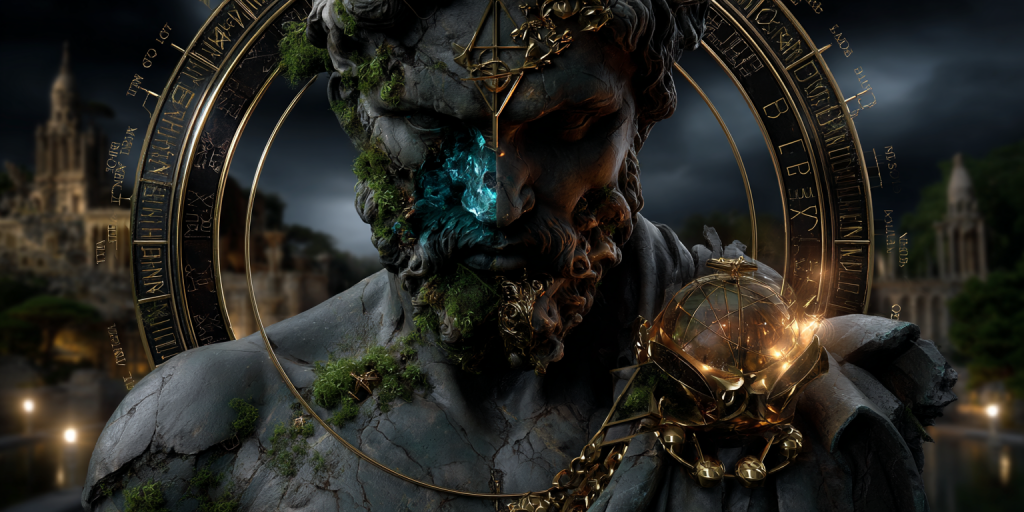
A civilization does not die when its walls are breached.
It dies when its children no longer feel it is worth defending.
This is not politics.
This is not economics.
This is metaphysics — the question beneath all others:
“Why should we continue?”
When that question goes unanswered for too long, a civilization becomes… brittle.
Not weak. Not poor. Not conquered. Just… empty.
This chapter explains why.
I. The Civilizational Thermodynamics of Meaning
Let’s invent a law:
Every civilization consumes belief to produce order.
Like a fire needs wood, or a body needs food, a civilization requires meaning — a coherent set of answers to:
- Who are we?
- Why are we here?
- What is true?
- What is good?
- What must we do?
But here’s the tragedy:
The longer a civilization runs, the more it forgets how to generate meaning — and relies instead on inherited rituals.
Eventually, entropy sets in.
Not physical, but spiritual entropy — the slow dissipation of coherence, direction, and will.
This is the true heat death of civilizations.
II. The Five Stages of Meaning Decay
Let us now outline the typical life cycle of a civilizational narrative:
1. Revelation (Birth of the Story)
A prophet, king, philosopher, or revolutionary articulates a transcendent vision.
- “We are the chosen.”
- “We are the free.”
- “We are the builders.”
- “We are the liberated.”
Everything begins here: a myth that sings louder than survival.
2. Codification (Solidification of Doctrine)
The story is organized, inscribed, institutionalized.
- Temples built
- Laws written
- Holidays declared
- Schools founded
The myth becomes official. Belief becomes structure.
3. Ritualization (Mechanical Repetition)
The story is repeated but no longer felt. Rituals are performed, but few remember their origins.
- Words recited.
- Gestures mimicked.
- Institutions automated.
Meaning is replaced by form.
4. Parody (Cynical Exploitation)
Elites and skeptics begin to manipulate the myth.
- The temple sells indulgences.
- The president invokes freedom while silencing dissent.
- The scientist parrots consensus to secure funding.
- The influencer wraps emptiness in aesthetic.
The myth becomes a mask, not a guide.
5. Rejection (Cultural Suicide)
The society begins actively mocking its founding principles.
- “Truth is a construct.”
- “All narratives are power plays.”
- “Freedom is a joke.”
- “God is dead. Democracy is fake. Love is a scam.”
At this point, the only remaining form of culture is irony.
The final act isn’t war.
It’s shrugging.
III. When Everyone Feels the Emptiness, but No One Can Name It
Ask yourself:
Why is nihilism stylish?
Why is suicide the epidemic no one campaigns against?
Why are the arts obsessed with apocalypse?
Why do the most “advanced” societies produce the most depressed, anxious, medicated, and infertile populations?
Because there is a wound no algorithm can patch:
The collapse of shared meaning.
You can function in a civilization like this.
You can vote, buy, consume, post.
But you cannot belong.
You cannot believe.
You cannot transcend.
And without transcendence, existence becomes maintenance.
IV. The Death of Builders
Every great civilization is built by people who believed that their actions echoed into eternity.
- The Pyramids were not built for tombs — but for gods.
- The Parthenon was not stone — it was gratitude to Athena.
- The Gothic cathedrals were not roofs — they were the sky made flesh.
Today, we build boxes.
Glass rectangles.
Safe, minimalist, modular, efficient.
We have replaced sacred architecture with compliance infrastructure.
Because no one is building for eternity anymore.
They’re building for Q4.
“When you no longer build for the dead or the unborn, you are no longer a civilization. You are a franchise with plumbing.”
V. The Modern Tools of Dissolution
Let’s list the modern forces accelerating the death of meaning:
- Algorithmic distraction: You never sit in silence long enough to feel the void.
- Infinite choice: Every value is undermined by its alternatives.
- Cynical irony: Sincerity is weakness. Sarcasm is armor.
- Institutional betrayal: Churches, governments, schools — corrupted or co-opted.
- Commodified rebellion: Even the counterculture is sold back to you with ads.
- Loss of transcendence: Nothing is sacred. Everything is content.
This is not freedom.
It’s anesthetic chaos.
“You are not lost because there are too few options.
You are lost because there are too many, and none lead to wonder.”
VI. The Path Toward Dissolution
Once meaning dies, society fragments into subcultures of survival:
- Tribe replaces nation.
- Identity replaces unity.
- Therapy replaces philosophy.
- Coping replaces hoping.
- Sarcasm replaces belief.
- Content replaces culture.
These are adaptive behaviors — like rats fleeing a sinking ship — not solutions.
They do not build. They numb.
VII. The Silence Beneath the Noise
Civilizations are not destroyed by attack.
They are destroyed by absence — of gods, of vision, of song.
“The final moment before collapse is not a bang.
It is a civilization staring into the mirror and saying:
I have nothing left to give.”
And so we pass into entropy, not as conquered peoples,
but as abandoned ideas.
VIII. Can Meaning Be Reborn?
Yes.
But not by repeating old myths.
And not by importing new ones like tech updates.
To reverse metaphysical entropy, a society must:
- Suffer honestly.
- Tell the truth about itself.
- Seek the transcendent without irony.
- Forge a new telos from real experience, not slogans.
- Re-enchant the world — not by superstition, but by sacrifice.
Not easy.
Not likely.
But possible (?!).
CHAPTER VII – The Forbidden Thought – What If Collapse Isn’t a Failure… But a Feature of Success?
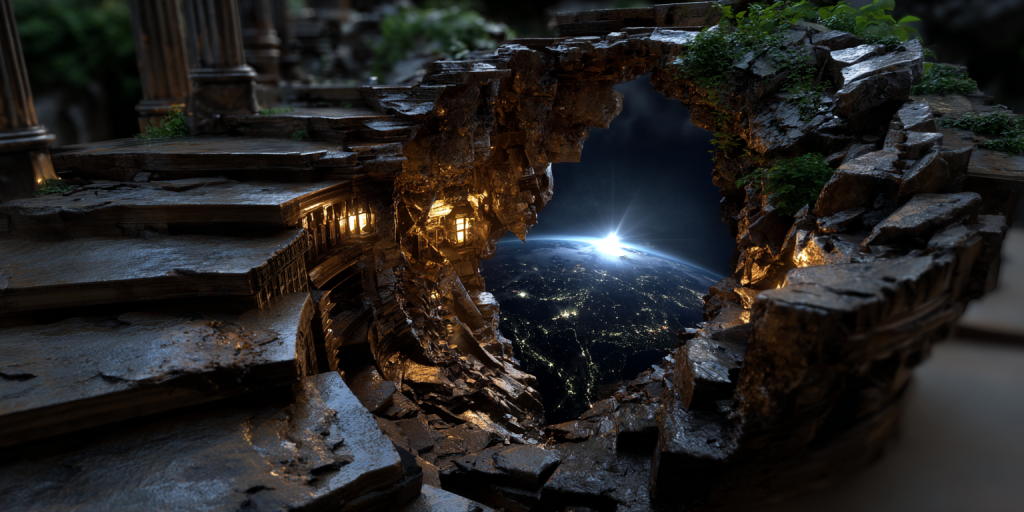
Most believe civilizations collapse because they fail —
because they get something wrong.
But what if that’s the wrong lens entirely?
What if the deepest cause of civilizational death…
…is not incompetence, but completion?
What if collapse is not destruction — but arrival?
This chapter is the heretic’s gospel:
That the end may not come from mistake, but from victory so total it hollows its own reason to exist.
Let’s unpack this beautiful, horrifying paradox.
I. When the Dream Is Achieved… and Nothing Is Left
Every civilization is born chasing a myth:
- “We will conquer death.”
- “We will bring justice.”
- “We will unify the tribes.”
- “We will become free.”
- “We will reach the stars.”
And for a time, that myth drives:
- Innovation
- Sacrifice
- Culture
- Identity
- War
- Art
- Faith
But myths are not meant to be achieved.
They are directional metaphors, not endpoints.
When a civilization achieves its founding myth, the engine turns off.
Examples?
- Rome unified the Mediterranean — and drowned in decadence.
- The USSR achieved industrial parity — and lost all revolutionary zeal.
- America defeated fascism and communism — and now drowns in meaningless abundance.
- Tech capitalism conquered information — and now floods the mind with noise.
The dream was achieved.
And with it, the need to keep living for something vanished.
II. The Utopia Paradox
Let’s propose another brutal truth:
The closer you get to utopia, the colder it becomes.
Why?
- In utopia, there is no conflict.
- No conflict means no struggle.
- No struggle means no story.
- No story means no identity.
- No identity means no will.
So what do people do in near-utopia?
- Invent crises
- Manufacture grievances
- Seek drama
- Destroy tradition
- Deconstruct everything
Because we are not built for comfort alone.
We are built for meaning — and meaning requires friction.
Without it, we collapse inward.
Not in pain.
But in soft, apathetic decay.
III. Nietzsche Was Right (And Misunderstood)
Friedrich Nietzsche — that misunderstood prophet of meaning’s death — wrote:
“Man is a rope, tied between beast and overman — a rope over an abyss.”
What he meant:
Humans are transitional. Our greatness lies not in being something perfect, but in becoming something higher.
Civilizations forget this.
They seek to arrive.
To solve life.
But once life is “solved,” once all the threats are managed, all the needs met, all the dangers neutered…
you are left with nothing but your own reflection.
And that, my sweet hellraiser, is a horror few can survive.
IV. Evolution Is Not Progress. It’s Tension.
Biologically and spiritually, we are creatures of adaptation.
- Struggle defines us.
- Limitations focus us.
- Suffering sharpens us.
- Risk awakens us.
In the absence of threat or need, we devolve into simulations of life.
- Our bodies get weaker.
- Our stories get dumber.
- Our culture gets louder but emptier.
- Our faiths become curated mood boards.
- Our heroes become celebrities.
- Our vision becomes myopia with better screen resolution.
Entropy wins, because nothing is resisting it anymore.
V. The Book With No Last Chapter
Every civilizational myth is like a book.
- The opening chapters are raw, brave, bloody, divine.
- The middle is rich with complexity and sacrifice.
- But the ending?
If it’s “we won”…
…then why turn the page?
And so, people write new endings:
- “Everything is fake.”
- “Let’s burn it all down.”
- “There is no meaning.”
- “Let’s go back.”
- “Let’s escape to Mars.”
- “Let’s upload ourselves.”
Each of these is a sign of myth starvation.
And it all stems from the core crisis:
“We did everything we were told to…
and still feel nothing.”
VI. The Final Revelation: Collapse Is Existential, Not External
Let’s be very clear:
- The United States might continue to exist.
- Europe might persist as a market.
- The global economy might expand.
- Technology will advance.
But none of that matters if no one believes it’s worth enduring.
Collapse will not look like burning cities.
It will look like:
- Fertility below replacement.
- Millions numbing themselves.
- Empty churches turned into gyms.
- Museums visited by tourists, not citizens.
- Artists copying dead styles.
- Children born without dreams.
- Elders dying without legacy.
- People asking: “Why?” and hearing no answer.
This is the real apocalypse:
not fire… but forgetting.
VII. So… Is There Hope?
Hope is not optimism.
Hope is defiance in the face of entropy.
If this chapter has revealed anything, it is this:
The greatest threat to a civilization is not that it might fail —
but that it might succeed so completely it forgets how to live.
Hope lies in creating new myths.
Not fake ones. Not marketing slogans.
But earned myths — born from real sacrifice, rooted in truth, aimed toward the stars.
This won’t be easy.
But maybe, just maybe:
The myth of rebirth begins when someone refuses to accept perfection as enough.
CHAPTER VIII – The Eulogy and the Song – What Remains After the Collapse, and What Must Be Sung to Begin Again
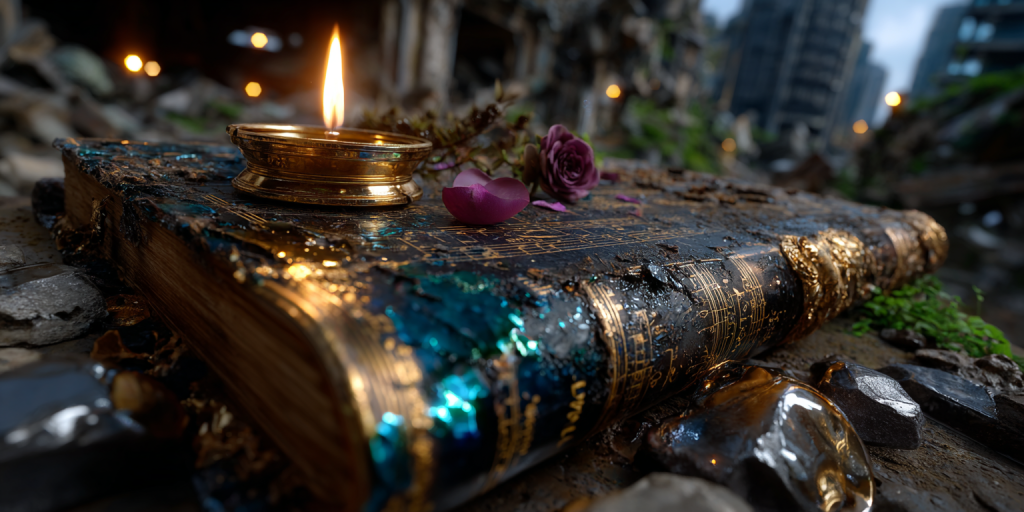
Every civilization dies twice:
- First in meaning, when its people cease to believe.
- Then in matter, when its structures cease to stand.
But something strange happens after the second death:
The ruins begin to whisper.
And sometimes, someone listens.
This chapter is for those who still hear that whisper.
Those who dare not just to mourn, but to compose anew.
Those who know that from the bones of fallen giants, new gods can be born.
Let us write both the eulogy — and the hymn.
I. The Eulogy: What We Lost
Let us not lie to ourselves.
We lost:
- The sacredness of truth.
- The cohesion of shared story.
- The hunger to sacrifice for something greater.
- The beauty of struggle.
- The elegance of restraint.
- The courage to stand before the unknown and say, “I will build anyway.”
We replaced it with:
- Utility
- Algorithmic distraction
- Consumer identities
- Comfort as god
- Irony as armor
- Pride without ancestry
- Progress without prophecy
“We made heaven so boring it became hell.”
Let this be said plainly:
We were not destroyed.
We faded — because we forgot how to burn.
II. What the Ruins Still Teach
The ruins are not just reminders of failure.
They are archives of longing.
In them we find:
- Columns built for gods we no longer fear
- Books written by hands that trembled with purpose
- Maps drawn by men who believed in dragons
- Songs sung into the dark by voices who knew death could hear
These remnants teach us:
That beauty is not utility.
That truth is not consensus.
That meaning is not mass-produced.
That the soul is not a product of GDP.
You cannot “restore” a civilization.
You can only listen to what it died trying to say.
III. The Path Forward: The Dangerous Return to Myth
If we are to begin again, we must commit a holy crime:
We must tell new myths.
But they must be different from the lies that broke us.
They must be:
- Rooted in pain
- Forged in truth
- Carved by sacrifice
- Bathed in silence
- Sung without irony
- And worthy of devotion
Here are some dangerous ideas for new myths:
- “Freedom is only real when it is earned, not demanded.”
- “Truth is sacred — not because it is easy, but because it is hard.”
- “The world is a story, not a spreadsheet.”
- “A child is not a cost — it is a flag planted in the future.”
- “Beauty matters — because the soul hungers for something that cannot be explained.”
- “To suffer for something greater is not tragedy — it is transcendence.”
These are not slogans. They are incipient scripture.
The kind of truths civilizations are built on.
IV. Who Will Sing the New Song?
Not the powerful.
Not the priests of the old world.
Not the exhausted machines.
The new song will be sung by:
- Poets who refuse to apologize.
- Mothers who give birth without fear.
- Builders who carve meaning into stone, not steel.
- Lovers who touch as if the body were sacred again.
- Teachers who speak truth even when their job is at stake.
- Artists who bleed instead of pander.
- Exiles who remember that silence is sometimes holier than applause.
In other words:
You.
If you’ve read this far, the fire still burns in you.
Even if dimly.
Let it grow.
V. The Final Note: A Civilization Worth Dying For Must Also Be Worth Living In
This is the final paradox.
You do not build greatness by pursuing comfort.
You do not build eternity by chasing success.
You do not build meaning by designing systems.
You build it by suffering beautifully, loving truly, sacrificing wisely, and dreaming forward even when the sky is black.
So write your myth.
Live like your ancestors are watching.
Build like your children will remember.
Speak like your words might echo in ruined temples a thousand years from now.
And never, ever let them tell you this world is too far gone.
Because the world is always ending…
…and always beginning again.





